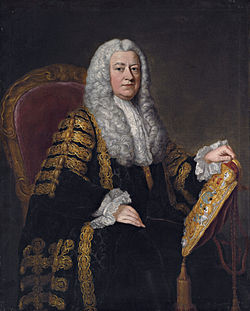Lord Hardwicke
|
The Right Honourable The Earl of Hardwicke PC |
|
|---|---|
 |
|
| Lord Chancellor | |
|
In office 1737–1756 |
|
| Prime Minister |
Robert Walpole The Earl of Wilmington Henry Pelham The Duke of Newcastle |
| Preceded by | The Lord Talbot |
| Succeeded by | in commission, next held by Sir Robert Henley (as Lord Keeper) |
| Personal details | |
| Born |
c. 1 December 1690 Dover, Kent, England |
| Died | 6 March 1764 (aged 73) London, England |
| Nationality | British |
| Profession | Lawyer |
Philip Yorke, 1st Earl of Hardwicke PC (1 December 1690 – 6 March 1764) was an English lawyer and politician who served as Lord Chancellor. He was a close confidant of the Duke of Newcastle, Prime Minister between 1754 and 1756 and 1757 until 1762.
A son of Philip Yorke, an attorney, he was born at Dover. Through his mother, Elizabeth, daughter and co-heiress of Richard Gibbon of Rolvenden, Kent, he was connected with the family of Edward Gibbon the historian. He was educated at a school in Bethnal Green run by Samuel Morland, a nonconformist.
At age 16 Yorke entered the attorney's office of Charles Salkeld in Holborn, London. He was entered at the Middle Temple in November 1708, and perhaps recommended by his employer to Lord Chief Justice Parker as law tutor to his sons.
In 1715 Yorke was called to the bar, where his progress was, says Lord Campbell, more rapid than that of any other debutant in the annals of our profession, his advancement being greatly furthered by the patronage of Macclesfield, who became lord chancellor in 1718, when Yorke transferred his practice from the king's bench to the court of chancery, though he continued to go on the western circuit. In the following year he established his reputation as an equity lawyer in a case in which Robert Walpole's family was interested, by an argument displaying profound learning and research concerning the jurisdiction of the chancellor, on lines which he afterwards more fully developed in a celebrated letter to Lord Kames on the distinction between law and equity. Through Macclesfield's influence with the Duke of Newcastle Yorke entered parliament in 1719 as member for Lewes, and was appointed solicitor-general, with a knighthood, in 1720, although he was then a barrister of only four years standing.
...
Wikipedia
